- Home
- Dave Pelzer
A Child Called It Page 6
A Child Called It Read online
Page 6
From the kitchen I could hear Father in the living room, flipping through his newspaper. I took a painfully deep breath, hoping that I could shove off and make my way to Dad. But I breathed too hard, and fell to the floor. After that I realized I had to take short, choppy breaths. I made my way into the living room. Sitting on the far end of the couch was my hero. I knew he would take care of Mother and drive me to the hospital. I stood before Father, waiting for him to turn his page and see me. When he did, I stuttered, “Father . . . Mo . . . Mo . . . Mother stabbed me.”
He didn’t even raise an eyebrow. “Why?” he asked.
“She told me if I didn’t do the dishes on time, she . . . she’d kill me.”
Time stood still. From behind the paper I could hear Father’s labored breathing. He cleared his throat before saying, “Well . . . you ah . . . you better go back in there and do the dishes.” My head leaned forward as if to catch his words. I couldn’t believe what I had just heard. Father must have sensed my confusion when I saw him snap his paper and heard him raise his voice saying, “Jesus H. Christ! Does Mother know that you’re here talking to me? You better go back in there and do the dishes. Damn it boy, we don’t need to do anything that might make her more upset! I don’t need to go through that tonight. . . .” Father stopped for a second, took a deep breath and lowered his voice, whispering, “I tell you what: you go back in there and do the dishes. I won’t even tell her that you told, okay? This will be our little secret. Just go back in the kitchen and do the dishes. Go on now, before she catches the both of us. Go!”
I stood before Father in total shock. He didn’t even look at me. Somehow I felt if he could at least turn a corner flap of the paper and search into my eyes, he would know; he would feel my pain, how desperate I was for his help. But, as always, I knew that Mother controlled him like she controlled everything that happened in her house. I think Father and I both knew the code of “the family”—if we don’t acknowledge a problem, it simply does not exist. As I stood before Father, not knowing what to do next, I looked down and saw droplets of blood staining the family’s carpet. I had felt in my heart that he would scoop me up in his arms and take me away. I even imagined him ripping off his shirt to expose his true identity, before flying through the air like Superman.
I turned away. All my respect for Father was gone. The savior I had imagined for so long was a phony. I felt more angry at him than I did at Mother. I wished that somehow I could fly away, but the throbbing pain brought me back to reality.
I washed the dishes as fast as my body would let me. I quickly learned that moving my forearm resulted in a sharp pain above my stomach. If I sidestepped from the wash basin to the rinse basin, another pain raced through my body. I could feel what little strength I had, draining away. As Mother’s time limit passed, so did my chances of getting fed.
I wanted to just lie down and quit, but the promise I made years ago kept me going. I wanted to show The Bitch that she could beat me only if I died, and I was determined not to give in, even to death. As I washed the dishes, I learned that by standing on my toes and leaning my upper body towards the counter top, I could relieve some of the pressure on my lower chest. Instead of sidestepping every few seconds, I washed a few dishes at a time, then moved over and rinsed them all together. After drying the dishes, I dreaded the task of putting them away. The cupboards were above my head, and I knew reaching for them would cause great pain. Holding a small plate, I stretched my legs as far as I could and tried to raise my arms above my head to put the dish away. I almost made it, but the pain was too great. I crumbled to the floor.
By now, my shirt was saturated with blood. As I tried to regain my footing, I felt Father’s strong hands helping me. I brushed him away. “Give me the dishes,” he said. “I’ll put them away. You better go downstairs and change that shirt.” I didn’t say a word as I turned away. I looked at the clock. It had taken me nearly an hour and a half to complete my chore. My right hand clamped tightly onto the railing, as I slowly made my way downstairs. I could actually see the blood seep from my T-shirt with every step I took.
Mother met me at the bottom of the stairs. As she tore the shirt from my body, I could see Mother was doing it as gently as she could, however, she gave me no other comfort. I could see it was just a matter of business to her. In the past, I had seen her treat animals with more compassion than she did me.
I was so weak that I accidentally fell against her as she dressed me in an old, oversized T-shirt. I expected Mother to hit me, but she allowed me to rest against her for a few seconds. Then Mother set me at the bottom of the stairs and left. A few minutes later, Mother returned with a glass of water. I gulped it down as fast as I could swallow. When I finished, Mother told me that she couldn’t feed me right away. She said she would feed me in a few hours when I felt better. Again, her voice was monotone—completely without emotion.
Stealing a glance, I could see the California twilight being overtaken by darkness. Mother told me I could play outside with the boys, on the driveway in front of the garage door. My head was not clear. It took me a few seconds to understand what she had said. “Go on, David. Go,” she persisted. With Mother’s help, I limped out of the garage to the driveway. My brothers casually looked me over, but they were much more interested in lighting their Fourth-of-July sparklers. As the minutes passed, Mother became more compassionate towards me. She held me by the shoulders as we watched my brothers make figure eights with their sparklers. “Would you like one?” Mother asked. I nodded yes. She held my hand as she knelt down to light the sparkler. For a moment, I imagined the scent of the perfume Mother wore years ago. But she had not used perfume or made up her face for a long time.
As I played with my brothers, I couldn’t help but think about Mother and the change in the way she was treating me. “Is she trying to make up with me?” I wondered. “Are my days living in the basement finally over? Am I back in the family fold?” For a few minutes I didn’t care. My brothers seemed to accept my presence, and I felt a feeling of friendship and warmth with them that I thought had been buried forever.
Within a few seconds my sparkler fizzled out. I turned towards the retreating sun. It had been forever since I had watched a sunset. I closed my eyes, trying to soak up as much heat as I could. For a few fleeting moments my pain, my hunger and my miserable way of life disappeared. I felt so warm, so alive. I opened my eyes, hoping to capture the moment for the rest of eternity.
Before she went to bed, Mother gave me more water and fed me some small bites of food. I felt like a disabled animal being nursed back to health, but I didn’t care.
Downstairs in the garage I laid on my old army cot. I tried not to think of the pain, but it was impossible to ignore as it crept throughout my body. Finally exhaustion took over and I drifted off to sleep. During the night I had several nightmares. I startled myself, waking up in a cold sweat. Behind me I heard a sound that scared me. It was Mother. She bent down and applied a cold wash cloth to my forehead. She told me that I had been running a fever during the night. I was too tired and weak to respond. All I could think about was the pain. Later, Mother returned to my brothers’ downstairs bedroom, which was closer to the garage. I felt safe knowing she was nearby to watch over me.
Soon I drifted back into darkness, and with the fitful sleep came a dreadful dream of sheets of red, hot rain. In the dream I seemed to drench in it. I tried wiping the blood off my body only to find it quickly covered again. When I awoke the next morning, I stared at my hands which were crusted with dried blood. The shirt covering my chest was entirely red. I could feel the dried blood on parts of my face. I heard the bedroom door behind me open, and I turned to see Mother walking towards me. I expected more sympathy like she had given me the night before, but it was an empty hope. She gave me nothing. In a cold voice, Mother told me to clean myself up and begin my chores. As I heard her march up the stairs, I knew nothing had changed. I was still the bastard of the family.
About three
days after the “accident,” I continued to feel feverish. I didn’t dare ask Mother for even an aspirin, especially since Father was away at work. I knew she was back to her normal self. I thought the fever was due to my injury. The slit in my stomach had opened up more than once since that night. Quietly, so Mother wouldn’t hear me, I crept to the garage sink. I picked up the cleanest rag I could find in my heap of rags. I cracked the water faucet open just enough to let a few drops of water spill onto the rag. Then I sat down and rolled up my red, soggy shirt. I touched my wound, flinching from the pain. I took a deep breath and as gently as possible, pinched the slit. The pain was so bad I threw my head back against the cold concrete floor, almost knocking myself out. When I looked at my stomach again, I saw a yellowish-white substance begin to ooze from the red, angry slash. I didn’t know much about such things, but I knew it was infected. I started to get up to go upstairs and ask Mother to clean me up. When I was half-standing, I stopped. “No!” I told myself. “I don’t need that bitch’s help.” I knew enough about basic first-aid training to clean a wound, so I felt confident that I could do it alone. I wanted to be in charge of myself. I didn’t want to rely on Mother or give her any more control over me than she already had.
I wet the rag again and brought it down towards my wound. I hesitated before I touched it. My hands were shaking with fear, as tears streamed down my face. I felt like a baby and hated it. Finally I told myself, “You cry, you die. Now, take care of the wound.” I realized that my injury probably wasn’t life-threatening; I brainwashed myself to block out the pain.
I moved quickly before my motivation slipped away. I snatched another rag, rolled it up and stuffed it into my mouth. I focused all my attention on the thumb and first finger of my left hand, as I pinched the skin around my slit. With my other hand I wiped away the pus. I repeated the process until blood seeped through, and I was wiping away only blood. Most of the white stuff was gone. The pain from the pinching and wiping was more than I could stand. With my teeth clamped tightly on the rag, my screaming was muffled. I felt as though I was hanging from a cliff. By the time I finished, a river of tears soaked the neck of my shirt.
Fearing Mother would catch me not sitting at the bottom of the stairs, I cleaned up my mess then half-walked, half-crawled to my assigned place at the foot of the staircase. Before I sat on my hands, I checked my shirt; only small drops of blood escaped from the wound to the rag bandage. I willed the wound to heal. Somehow I knew it would. I felt proud of myself. I imagined myself like a character in a comic book, who overcame great odds and survived. Soon my head slumped forward and I fell asleep. In my dream, I flew through the air in vivid colors. I wore a cape of red . . . I was Superman.
CHAPTER
6
While Father
Is Away
After the knife incident, Father spent less and less time at home and more at work. He made excuses to the family, but I didn’t believe him. I often shivered with fear as I sat in the garage, hoping for some reason he might not leave. In spite of all that had happened, I still felt Father was my protector. When he was home, Mother only did about half the things to me that she did when he was gone.
When Father was home, it became his habit to help me with the evening dishes. Father washed and I dried. While we worked, we talked softly so neither Mother nor the other boys could hear us. Sometimes, several minutes would pass without us talking. We wanted to make sure the coast was clear.
Father always broke the ice. “How ya doin’, Tiger?” he would say.
Hearing the old name that Father used when I was a little boy, always brought a smile to my face. “I’m okay,” I would answer.
“Did you have anything to eat today?” he often asked. I usually shook my head in a negative gesture.
“Don’t worry,” he’d say. “Some day you and I will both get out of this madhouse.”
I knew father hated living at home, and I felt that it was all my fault. I told him that I would be good and that I wouldn’t steal food anymore. I told Father I would try harder and do a better job on my chores. When I said these things, he always smiled and assured me that it wasn’t my fault.
Sometimes as I dried the dishes, I felt a new ray of hope. I knew Father probably wouldn’t do anything against Mother, but when I stood beside him I felt safe.
Like all good things that happened to me, Mother put an end to Father helping me with the dishes. She insisted that The Boy needed no help. She said that Father paid too much attention to me and not enough to others in the family. Without a fight, Father gave up. Mother now had complete control over everybody in the household.
After awhile, Father didn’t even stay home on his days off. He would come in for only a few minutes. After seeing my brothers, he would find me wherever I was doing my chores and say a few sentences, then leave. It took Father no more than 10 minutes to get in and out of the house, and be on his way back to his solitude, which he usually found in a bar. When Father talked to me, he’d tell me that he was making plans for the two of us to leave. This always made me smile, but deep inside I knew it was a fantasy.
One day, he knelt down to tell me how sorry he was. I looked into his face. The change in Father frightened me. He had dark black circles around his eyes, and his face and neck were beet red. Father’s once-rigid shoulders were now slumped over. Gray had begun to take over his jet-black hair. Before he left that day, I threw my arms around his waist. I didn’t know when I would see him again.
After finishing my chores that day, I rushed downstairs. I had been ordered to wash my ragged clothes and another heap of smelly rags. But that day, Father’s leaving had left me so sad that I buried myself in the pile of rags and cried. I cried for him to come back and take me away. After a few minutes of self-comfort, I settled down and began scrubbing my “Swiss cheese” clothes. I scrubbed until my knuckles bled. I no longer cared about my existence. Mother’s house had become unbearable. I wished I could somehow manage to escape the place I now called the “Madhouse.”
During one period of time when Father was away, Mother starved me for about ten consecutive days. No matter how hard I tried to meet her time limits, I couldn’t make it. And the consequence was no food. Mother was completely thorough in making sure I was unable to steal any food. She cleared the dinner table herself, putting the food down the garbage disposal. She rummaged through the garbage can every day before I emptied it downstairs. She locked the freezer in the garage with her key and kept it. I was used to going without food for periods up to three days, but this extended time was unbearable. Water was my only means of survival. When I filled the metal ice cube tray from the refrigerator, I would tip the corner of the tray to my mouth. Downstairs I would creep to the wash basin and crack the faucet tap open. Praying that the pipe would not vibrate and alert Mother, I would carefully suck on the cold metal until my stomach was so full I thought it would burst.
By the sixth day I was so weak when I woke up on my army cot, I could hardly get up. I worked on my chores at a snail’s pace. I felt so numb. My thought responses became unclear. It seemed to take minutes for me to understand each sentence Mother yelled to me. As I slowly strained my head up to look at Mother, I could tell that to her it was a game—a game which she thoroughly enjoyed.
“Oh, poor little baby,” Mother sarcastically cooed. Then she asked me how I felt, and laughed when I begged for food. At the end of the sixth day, and those that followed, I hoped with all my heart that Mother would feed me something, anything. I was at a point that I didn’t care what it was.
One evening, towards the end of her “game,” after I had finished my chores, Mother slammed a plate of food in front of me. The cold leftovers were a feast to my eyes. But I was wary; it seemed too good to be true. “Two minutes!” Mother barked. “You have two minutes to eat. That’s all.” Like lightening I picked up the fork, but the moment before the food touched my mouth, Mother snatched the plate away from me and emptied the food down the garbage disposal. “
Too late!” she sneered.
I stood before her dumbstruck. I didn’t know what to do or say. All I could think of was “Why?” I couldn’t understand why she treated me the way she did. I was so close that I could smell every morsel. I knew she wanted me to cave in, but I stood fast and held back the tears.
Alone in the garage, I felt I was losing control of everything. I craved food. I wanted my father. But more than anything, I wanted just an ounce of respect; one little bit of dignity. Sitting there on my hands, I could hear my brothers opening the refrigerator to get their desserts, and I hated it. I looked at myself. My skin had a yellowish tint, and my muscles were thin and stringy. Whenever I heard one of my brothers laugh at a television show, I cursed their names. “Lucky bastards! Why doesn’t she take turns and beat up on one of them for a change?” I cried to myself as I vented my feelings of hatred.
For nearly ten days I had gone without food. I had just finished the dinner dishes when Mother repeated her “you have two minutes to eat” game. There were only a few bits of food on the plate. I felt she would snatch the plate away again, so I moved with a purpose. I didn’t give Mother a chance to snatch it away like she had the past three evenings. So I grabbed the plate and quickly swallowed the food without chewing it. Within seconds, I finished eating all that was on the plate and licked it clean. “You eat like a pig!” Mother snarled. I bowed my head, acting as though I cared. But inside I laughed at her, saying to myself, “Fuck you! Say what you want! I got the food!”
Mother had another favorite game for me while Father was away. She sent me to clean the bathroom with her usual time limits. But this time, she put a bucket, filled with a mixture of ammonia and Clorox, in the room with me and closed the door. The first time she did this, Mother informed me she had read about it in a newspaper and wanted to try it. Even though I acted as if I were frightened, I really wasn’t. I was ignorant about what was going to happen. Only when Mother closed the door and ordered me not to open it, did I begin to worry. With the room sealed, the air began to quickly change. In the corner of the bathroom I dropped to my hands and knees and stared at the bucket. A fine gray mist swirled towards the ceiling. As I breathed in the fumes, I collapsed and began spitting up. My throat felt like it was on fire. Within minutes it was raw. The gas from the reaction of the ammonia and Clorox mixture made my eyes water. I was frantic about not being able to meet Mother’s time limits for cleaning the bathroom.

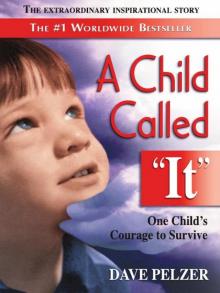 A Child Called It: One Child's Courage to Survive
A Child Called It: One Child's Courage to Survive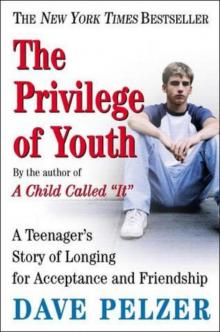 The Privilege of Youth: A Teenager's Story
The Privilege of Youth: A Teenager's Story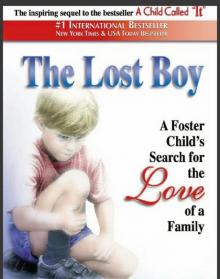 The Lost Boy: A Foster Child's Search for the Love of a Family
The Lost Boy: A Foster Child's Search for the Love of a Family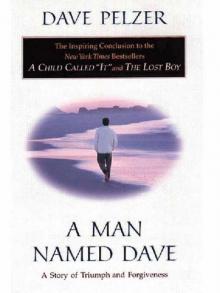 A Man Named Dave
A Man Named Dave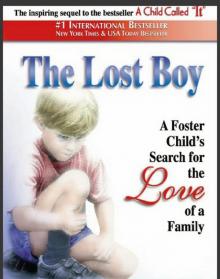 The Lost Boy
The Lost Boy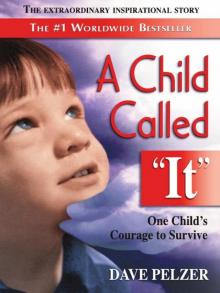 A Child Called It
A Child Called It